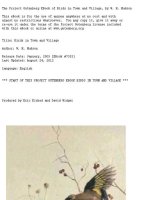The Project Gutenberg EBook of Birds in Town and Village, by W. H. Hudson doc
Bạn đang xem bản rút gọn của tài liệu. Xem và tải ngay bản đầy đủ của tài liệu tại đây (1.76 MB, 636 trang )
The Project Gutenberg EBook of Birds in
Town and Village, by W. H. Hudson
This eBook is for the use of anyone
anywhere at no cost and with
almost no restrictions whatsoever. You
may copy it, give it away or
re-use it under the terms of the Project
Gutenberg License included
with this eBook or online at
www.gutenberg.org
Title: Birds in Town and Village
Author: W. H. Hudson
Release Date: January, 2005 [EBook #7353]
Last Updated: August 24, 2012
Language: English
*** START OF THIS PROJECT GUTENBERG EBOOK
BIRDS IN TOWN AND VILLAGE ***
Produced by Eric Eldred and David WidgerGOLDFINCH AND BLUE TIT.
"The desire for the companionship of
birds."
BIRDS IN TOWN
& VILLAGE
BY
W. H. HUDSON,
F.Z.S.
AUTHOR OF "THE
PURPLE LAND," "IDLE
DAYS IN PATAGONIA,"
"FAR AWAY AND LONG
AGO," ETC.
WITH PICTURES IN
COLOUR
BY
E. J. DETMOLD
NEW YORK
E. P. DUTTON &
COMPANY
COPYRIGHT, 1920 By E.
P. DUTTON & COMPANY
PREFACE
THIS book is more than a mere reprint
o f Birds in a Village first published in
1893. That was my first book about bird
life, with some impressions of rural
scenes, in England; and, as is often the
case with a first book, its author has
continued to cherish a certain affection for
it. On this account it pleased me when its
turn came to be reissued, since this gave
me the opportunity of mending some faults
in the portions retained and of throwing
out a good deal of matter which appeared
to me not worth keeping.
The first portion, "Birds in a Village,"
has been mostly rewritten with some fresh
matter added, mainly later observations
and incidents introduced in illustration of
the various subjects discussed. For the
concluding portion of the old book, which
has been discarded, I have substituted
entirely new matter-the part entitled
"Birds in a Cornish Village."
vi P R E F A C E
Between these two long parts there are
five shorter essays which I have retained
with little alteration, and these in one or
two instances are consequently out of
date, especially in what was said with
bitterness in the essay on "Exotic Birds
for Britain" anent the feather-wearing
fashion and of the London trade in dead
birds and the refusal of women at that time
to help us in trying to save the beautiful
wild bird life of this country and of the
world generally from extermination.
Happily, the last twenty years of the life
and work of the Royal Society for the
Protection of Birds have changed all that,
and it would not now be too much to say
that all right-thinking persons in this
country, men and women, are anxious to
see the end of this iniquitous traffic.
W. H. H.
September, 1919.
CONTENTS
BIRDS IN A VILLAGE: PAGE
I. 1
II. 6
III. 18
IV. 36
V. 50
VI. 73
VII. 86
VIII. 107
IX 121
X. 148
XI. 153
EXOTIC BIRDS FOR BRITAIN
161
MOOR-HENS IN HYDE PARK . . . . .
.192
THE EAGLE AND THE CANARY
206
CHANTICLEER . . . . . . . . .222
IN AN OLD GARDEN 243
BIRDS IN A CORNISH VILLAGE:
I. TAKING STOCK OF THE BIRDS . .
. 265
II. DO STARLINGS PAIR FOR LIFE?
. . 275
III. VILLAGE BIRDS IN WINTER . . .
287
IV. INCREASING BIRDS IN BRITAIN
. . 295
V. THE DAW SENTIMENT 305
VI. STORY OF A JACKDAW 316
LIST OF COLORED
ILLUSTRATIONS
Goldfinch and Blue Tit . . . Frontispiece
Nightingale 10
Jay 24.
Wren 40
Song Thrush and Long-Tailed Tit . . . .
.60
Skylark 138
Heron 174
Moorhen 196
BIRDS IN TOWN &
VILLAGE
BIRDS IN A VILLAGE I
ABOUT the middle of last May, after a
rough and cold period, there came a spell
of brilliant weather, reviving in me the old
spring feeling, the passion for wild nature,
the desire for the companionship of birds;
and I betook myself to St. James's Park for
the sake of such satisfaction as may be had
from watching and feeding the fowls, wild
and semi-wild, found gathered at that
favored spot.
I was glad to observe a couple of those
new colonists of the ornamental water, the
dabchicks, and to renew my acquaintance
with the familiar, long-established
moorhens. One of them was engaged in
building its nest in an elm-tree grow-
2 BIRDS IN TOWN AND VILLAGE
ing at the water's edge. I saw it make
two journeys with large wisps of dry
grass in its beak, running up the rough,
slanting trunk to a height of sixteen to
seventeen feet, and disappearing within
the "brushwood sheaf" that springs from
the bole at that distance from the roots.
The wood-pigeons were much more
numerous, also more eager to be fed. They
seemed to understand very quickly that my
bread and grain was for them and not the
sparrows; but although they stationed
themselves close to me, the little robbers
we were jointly trying to outwit managed
to get some pieces of bread by flying up
and catching them before they touched the
sward. This little comedy over, I visited
the water-fowl, ducks of many kinds,
sheldrakes, geese from many lands, swans
black, and swans white. To see birds in
prison during the spring mood of which I
have spoken is not only no satisfaction but
a positive pain; here albeit without that
large liberty that nature gives, they are
free in a measure; and swimming and
diving or dozing in the sunshine, with the
blue sky above them, they are perhaps
unconscious of any restraint. Walking
along the margin I noticed three children
some yards ahead
BIRDS IN A VILLAGE 3
of me; two were quite small, but the
third, in whose charge the others were,
was a robust-looking girl, aged about ten
or eleven years. From their dress and
appearance I took them to be the children
of a respectable artisan or small
tradesman; but what chiefly attracted my
attention was the very great pleasure the
elder girl appeared to take in the birds.
She had come well provided with stale
bread to feed them, and after giving
moderately of her store to the wood-
pigeons and sparrows, she went on to the
others, native and exotic, that were
disporting themselves in the water, or
sunning themselves on the green bank. She
did not cast her bread on the water in the
manner usual with visitors, but was
anxious to feed all the different species, or
as many as she could attract to her, and
appeared satisfied when any one
individual of a particular kind got a
fragment of her bread. Meanwhile she
talked eagerly to the little ones, calling
their attention to the different birds.
Drawing near, I also became an interested
listener; and then, in answer to my
questions, she began telling me what all
these strange fowls were. "This," she said,
glad to give information, "is the Canadian
goose, and
4 BIRDS IN TOWN AND VILLAGE
there is the Egyptian goose; and here is
the king-duck coming towards us; and do
you see that large, beautiful bird standing
by itself, that will not come to be fed?
That is the golden duck. But that is not its
real name; I don't know them all, and so I
name some for myself. I call that one the
golden duck because in the sun its feathers
sometimes shine like gold." It was a rare
pleasure to listen to her, and seeing what
sort of a girl she was, and how much in
love with her subject, I in my turn told her
a great deal about the birds before us, also
of other birds she had never seen nor
heard of, in other and distant lands that
have a nobler bird life than ours; and after
she had listened eagerly for some minutes,
and had then been silent a little while, she
all at once pressed her two hands together,
and exclaimed rapturously, "Oh, I do so
love the birds!"
I replied that that was not strange, since
it is impossible for us not to love
whatever is lovely, and of all living things
birds were made most beautiful.
Then I walked away, but could not
forget the words she had exclaimed, her
whole appearance,
BIRDS IN A VILLAGE 5
the face flushed with color, the eloquent
brown eyes sparkling, the pressed palms,
the sudden spontaneous passion of delight
and desire in her tone. The picture was in
my mind all that day, and lived through the
next, and so wrought on me that I could not
longer keep away from the birds, which I,
too, loved; for now all at once it seemed
to me that life was not life without them;
that I was grown sick, and all my senses
dim; that only the wished sight of wild
birds could medicine my vision; that only
by drenching it in their wild melody could
my tired brain recover its lost vigour.
II
AFTER wandering somewhat aimlessly
about the country for a couple of days, I
stumbled by chance on just such a spot as I
had been wishing to find a rustic village
not too far away. It was not more than
twenty-five minutes' walk from a small
station, less than one hour by rail from
London.
The way to the village was through
cornfields, bordered by hedges and rows
of majestic elms. Beyond it, but quite
near, there was a wood, principally of
beech, over a mile in length, with a public
path running through it. On the right hand,
ten minutes' walk from the village, there
was a long green hill, the ascent to which
was gentle; but on the further side it
sloped abruptly down to the Thames.
On the left hand there was another hill,
with cottages and orchards, with small
fields interspersed on the slope and
summit, so that the
6
BIRDS IN A VILLAGE 7
middle part, where I lodged, was in a
pretty deep hollow. There was no sound
of traffic there, and few farmers' carts
came that way, as it was well away from
the roads, and the deep, narrow, winding
lanes were exceedingly rough, like the
stony beds of dried-up streams.
In the deepest part of the coombe, in the









